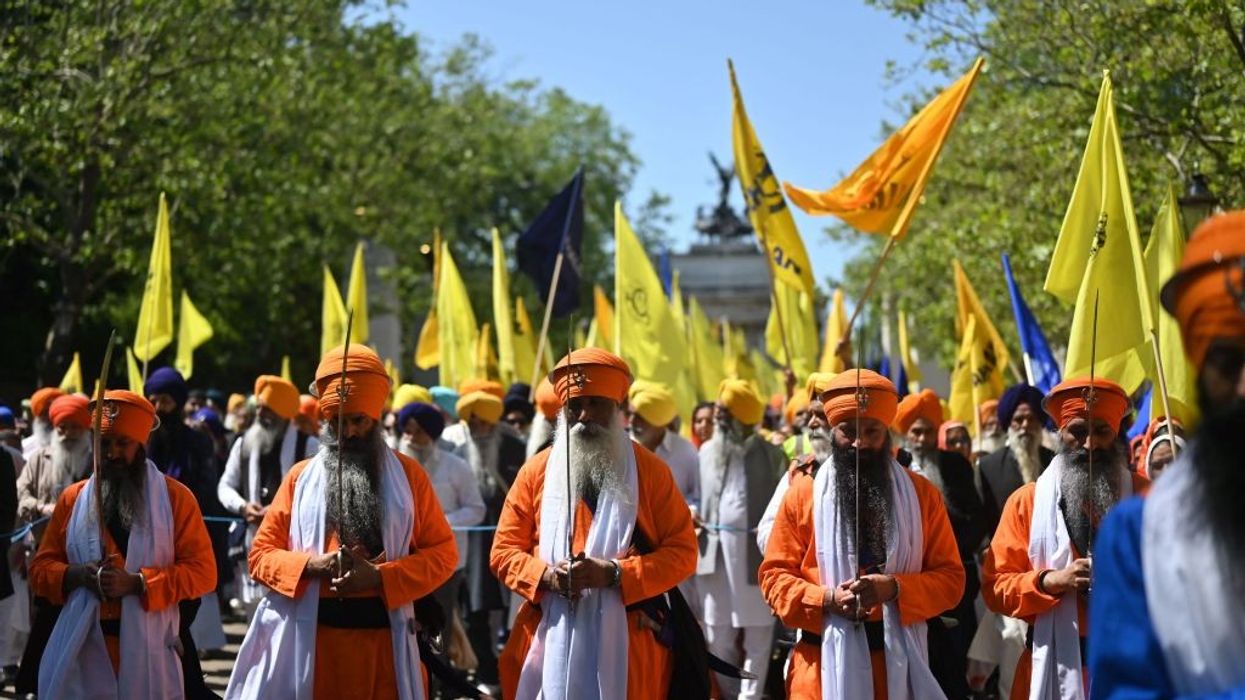BRITAIN's Sikh population, whose ancestors first migrated from the Punjab more than a century ago, have long been admired as a model of integration and for maintaining a strong identity.
Lauded in their country of origin and beyond for their valour, industriousness and charity, Sikhs took those values to Britain, which during the country's imperial past praised them as a martial race.
They won accolades for standing up to rioters in London in 2011, for charity work during the coronavirus pandemic, and most recently for feeding the hungry during the cost-of-living crisis.
"We don't often complain," Jas Singh, adviser to the Sikh Federation UK, which represents some 500,000 Sikhs in the UK, told AFP at the Guru Nanak Gurdwara in Smethwick, near Birmingham in central England.
But the tight-knit community is now appealing for help to address long-term issues such as racism and a lack of representation in politics and culture.
"We still need help just like everybody else," said Kulbinder Kaur Gakhal, an education administrator at the Smethwick gurdwara, one of the oldest and largest in Europe.
"The fact that we only have two Sikh MPs. Given our numbers, we should have maybe six or seven. Across the civil service, there's very low Sikh representation -- in the police, in education," added Jas Singh.
"This is a wall of discrimination that we face," he added.
Despite official figures showing a 169 percent rise in attacks on Sikhs in 2021/22, there is no approved definition for anti-Sikh hate crimes in the UK.
A statue outside the gurdwara paying tribute to the many Sikhs who fought with the UK in the world wars is frequently vandalised, said Gakhal.
"They have security cameras and information that's led them to know who's done it. But the authorities aren't able to pinpoint, so it's a shame," she added.
But it is an Indian crackdown on the Khalistan movement, which wants an independent Sikh state in India, and its wider global fallout that has left many in the community particularly concerned.
New Delhi has banned the movement as a security threat and taken a particular interest in those close to Amritpal Singh, a firebrand Sikh leader who was arrested in April in India after a month-long manhunt.
In February, hundreds of his supporters, some carrying swords and guns, had pushed past barricades outside a police station near Amritsar, demanding the release of an aide held inside.
Protests were held around the world over the manhunt, including in London, where Avtar Singh Khanda -- a friend of Amritpal Singh -- was accused by Indian media of pulling down an Indian flag.
The 35-year-old activist, who was never named by UK police as a suspect, died on June 15 after suddenly falling ill with blood cancer.
His funeral at the Smethwick temple, which has pro-Khalistan flags flying outside, was attended by thousands.
Trudeau's allegations
The announcement by Canadian prime minister Justin Trudeau in September that there were "credible allegations" linking India to the killing of another pro-Khalistan activist in Toronto on June 18 sent shockwaves through the Sikh diaspora.
India strenuously denies any links, but the announcement prompted Khanda's family and friends to demand a coroner's inquest into his death.
"I don't know what investigation they did, but it would have only taken a few hours," said Amit Singh, a volunteer at Smethwick-based Punjab broadcaster PBC.
"The community feels that they definitely didn't take anything seriously. Until an investigation occurs, doubt will remain," added Singh, who was with Khanda shortly before he was taken to hospital.
The High Commission of India in London did not reply to a request for comment on the case.
According to Jas Singh, more broadly there was now "a high level of apprehension and fear" among Britain's Sikhs, "especially those who travel back to India".
"There is extra security at the gurdwara. It's disappointing that the police and the authorities have not reached out to the community," he added.
He believes the UK government's desire to secure a trade deal with Prime Minister Narendra Modi's Hindu nationalist government has led them to ignore the community's concerns.
"Not only do we have their silence, but we also have them going the other way with (UK Prime Minister) Rishi Sunak announcing pro-Khalistan extremism as an issue.
"Sikhs have no arrests, no pending cases, no threat or risk to British interests," he added.
(AFP)





